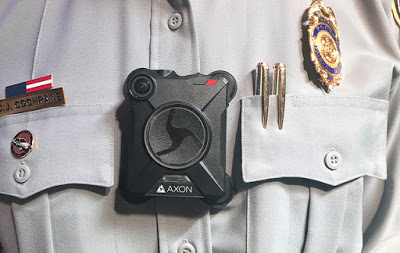Board of Supervisors to pursue body-worn cameras for police officers
 |
| A body-worn camera used in the FCPD pilot program. |
The Fairfax County Board of Supervisors’ Public Safety Committee agreed pursue a program for police officers to wear body cameras.
The committee agreed to draft an action item to be presented to the full Board of Supervisors Sept. 24.
BoS Chair Sharon Bulova spoke in favor of body-worn cameras (BWCs). Noting that members of the public are recording police actions and posting videos on Twitter and Facebook, she said, it’s important to tell “our side of what happened. We can’t not do this.”
While several supervisors had reservations about full implementation, only one, Pat Herrity (Springfield), said he opposed BWCs, citing the cost.
Fairfax County Police Chief Edwin Roessler Jr. urged the BoS to support BWC cameras after briefing them on an evaluation by American University researchers of a pilot program carried out March 3-Sept. 1, 2018, at the Mason, Mount Vernon, and Reston police stations. About half the officers at those police stations wore body cameras and half didn’t.
The evaluation found strong support among the public for BWCs but more of a mixed reaction from police officers.
The majority of community members who interacted with police officers during the pilot program reported feeling positive not only about their personal experience but also about the Fairfax County Police Department as a whole.
There was consensus among the police officers that the use of body cameras will “increase the gathering of evidence, help settle complaints against officers, and increase the department’s transparency to the public,” the report found.
Police officers disagreed, however, on whether the cameras will improve their legitimacy among community members, improve community relations generally, or increase officer safety.
Officers who wore the cameras were slightly more in favor of adoption, while those who weren’t assigned the cameras “were dramatically less favorable towards adoption,” the report states.
Some of the unfavorable views of the body-worn cameras (BWC) were revealed during a series of focus groups. “A notable number of participants contended that BWCs are needed only by departments with serious community relations problems, violent incidents, or corruption,” the report states. Because FCPD does not have those problems, some officers felt that funding for BWCs would be better spent on long-overdue raises.
“Most officers believed their behavior and that of community members did not change because of BWCs,” the report said. “They acknowledged initial resistance to BWCs, but said it has decreased with familiarity over time.”
The evaluation of the BWC pilot involved focus groups and surveys of police officers, community stakeholders, and community members who had interacted with officers during the pilot.
The evaluation found no real difference in performance of police officers with and without BWCs during the pilot period with regard to traffic stops, responses to both violent and non-violent incidents, and use of force.
There were fewer citizen complaints against officers with BWCs than officers without them.
The recommendations presented by Roessler call for FCPD to issue 1,210 BWCs to all operational police officers. The program would be phased in over three years, with the Mason Police District and the two others in the pilot getting BWCs during the first year.
The two biggest expenses would be contracted services – for equipment, licensing, storage of videos, and training at a cost of $29.86 million over a five-year contract period – and increased staffing at a cost of $19.5 million over five years.
The FCPD would need to hire five people, the Office of Commonwealth’s Attorney would need 33 new positions, and the county’s Information Technology Department would need six.


In 2015, I was the editor of Government Video magazine and arranged for then-DC Police Chief Cathy Lanier to address the attendees at that year's Government Video Expo on the use of police body cameras by DC's police. Lanier was highly in favor of using body cameras, and said that once officers use them, they are also highly in favor. It just eliminates the "he said/she said" interactions by police that consume so much time. Lanier said that when DC police responded to an incident with another police agency (US Park Police, Secret Service Police, FBI, etc.), the other agency's officers were also in favor of the body cameras — they knew that the body cameras provided evidence that all the police performed their roles properly.
After her talk at the GV Expo, police body cameras seem like a no-brainer to me. If the chief of police of a major city was so strongly in favor of body cameras, so am I. With its many police agencies, DC has to have the most complex police interactions in the country.
By the way… Lanier's all-time favorite cop TV show is "The Wire." Mine is "Hill Street Blues."
Its the ultimate device to get rid of all the illegals. That is really the deal.